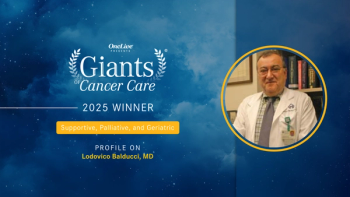
Second and Third-Line Decisions in RCC
Transcript:Robert A. Figlin, MD: Although, we should just say that we should remember the biology of kidney cancer. The biology of kidney cancer is it’s a VHL-driven (Von Hippel-Lindau) disease. We shouldn’t be surprised that VEGF receptor inhibitors, which are upregulated as a result in mutations and hypermethylations, have benefit down the road of treatment. Dan, we have agents in the frontline that are approved, we have agents in the second-line that are approved, and more and more patients are getting to the third-line. Is there anything that we would do differently in thinking about third- or fourth-line therapy for a kidney cancer patient than what we’ve mentioned, such as to identify the patient that’s progressing because of disease, not because of pseudoprogression, identify the risk factors associated with that patient and comorbidities to make sure that they could tolerate treatment? It seems like we’re going to see more and more patients getting to further lines of therapy. Again, it’s going to make it much more difficult to start to ask and answer questions scientifically, with new agents, in these populations of patients. Because they will have been exposed to so many agents before getting to an experimental trial. Your thoughts?
Daniel J. George, MD: It is really important to take a step back here. I want to go back to what we said at the beginning about goals of therapy. One of the things I do with my patients, every time we make another treatment selection, is we revisit the goals of therapy. Because, in the frontline setting, there’s a different set of goals of therapy than in the third-line setting. In the third-line setting, I’m rarely looking at a patient saying, “I’d like to get you to a durable PR, CR situation where maybe we can even take a break from therapy.” That conversation is gone. Those patients have had multiple progressions. In all likelihood, now we’re talking about therapy for life. And the goals of therapy get a little more balanced because now we’re not talking about cures or even these durable CRs. We’re talking now about can we just get cancer control? Can we prevent the deterioration from the disease causing your quality of life to deteriorate and balance that against your cumulative effect of toxicity?
The difference in third-line or fourth-line is, now you’re dealing with not just the toxicities of that drug or combination, but all the inherited complications from the disease and the cumulative toxicity that that patient has brought to bear to that situation. I’m not trying to sound negative, but this is really hard on people. And a lot of our patients just tire out; it just gets to the point where it’s just too much.
To me, I’m humbled by what these people can do sometimes in this third- or fourth-line of setting of therapy, that they can keep fighting, knowing what they’ve had to put up with, and knowing how many patients succumbed or had difficulty before them. That said, there are some of these patients—and we’ve seen it with other classes of agents—that just tolerate this stuff pretty well. We have these patients going for a few years on these drugs, and they don’t look that bad. So, just like the disease has a spectrum, the tolerance has a spectrum. What we find is that there’s probably a selection of some more tolerant patients in that third- or fourth-line setting and then others that are petering out. That’s what I’m dealing with in the mix there. And that’s what I balance in terms of how hard to push, whether it’s combinations or whether it’s a dose reduction of the different therapies.
Robert A. Figlin, MD: David?
David F. McDermott, MD: I would agree with everything that Dan said, except for one small caveat. In the CheckMate-025 pivotal trial and the cabozantinib METEOR trial, patients were allowed to have failed more than one treatment. So, in the case of the CheckMate-025 trial, you could have failed two TKIs to be on that study, and there’s a mix. There’s a pretty good percentage of patients who had failed more than two therapies. We have two trials with an OS improvement. In the case of the CheckMate-025 trial, we have quality-of-life improvement. And in the case of the METEOR study, we have PFS. So, I agree. Patients drop off, patients get beat up, but we have drugs that work now both in the second- and the third-line, depending on how you approach things. That’s a good problem. Getting back to the cabozantinib story, it’s not surprising to me that the drug beat everolimus. We’ve seen, in a couple of trials—Tom did a trial earlier comparing VEGF and mTOR inhibition—that VEGF is the dominant pathway. A VEGF inhibitor beat an mTOR inhibitor. But the amount that it beat it by—7 or more months of median PFS in that study, and an OS which we’ve never seen with a VEGF TKI—that’s pretty impressive. And that suggests, as you were mentioning before, that these other pathways beyond VEGF have a role, like MET and AXL; the potential escape pathways that tumors use.
To wrap all this up, I would hope that while we didn’t come up with predictors of these drugs when we had IL-2 and when we had Sutent, maybe with drugs with different mechanisms, we could actually come up with predictors. They’re already using prediction tools with PD-1 in lung cancer, so there’s hope in renal cancer. And similarly, if we’re working with an agent that targets these other pathways, maybe we can figure out who benefits from that.
Transcript Edited for Clarity





































